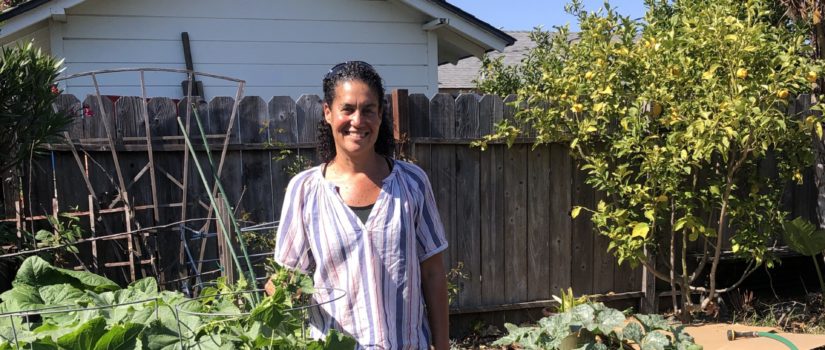Elizabeth Boner has been an educator her entire adult life, and she always assumed that owning a home in the Bay Area was out of reach for her. Now, a year after purchasing a modest home in the historic Atchison Village Cooperative in Richmond, Liz still can’t believe her good fortune. She doesn’t take any of it for granted.
Atchison Village was originally built by the government during World War II to house civilian workers in the defense industries, and Liz’s home is just a few miles from the Rosie the Riveter Museum. Atchison Village is a nonprofit owned cooperatively by its residents, which makes it more affordable than many homes in the Bay Area. But because of the way co-ops are structured, the units aren’t eligible for traditional mortgages. (Technically the residents don’t own their homes but instead own a share in the mutual housing corporation, which gives them the right to live in their homes.)
To get into her home, Liz needed to come up with the entire purchase price — modest by Bay Area housing standards, but a large sum for a teacher or anyone else earning a moderate salary. Liz has always lived frugally and saved as much as possible, and it still took all her savings plus a loan from her family to accomplish the purchase, along with an interest-free First-Time Homebuyer Loan from Hebrew Free Loan.
“Having a home is a privilege that I’m immensely grateful for. I’ve been a teacher in the Bay Area for the last 30 years, so I’ve been financially vulnerable, like so many educators. Hebrew Free Loan’s support made the process more manageable and gave me a tremendous sense of relief.”
Liz has spent the past year settling into her new home and adjusting to this new phase of life. She’s acutely aware that she is living on unceded Ohlone Territories — land that has been stewarded by the Ohlone people for thousands of generations. Now that she’s a homeowner, she feels even more responsibility for repairing these relations and living as a good guest on this land.
Liz has recently become involved with Jews On Ohlone Land, and she pays a voluntary Shuumi land tax to contribute to the vision set by local indigenous people working for the return of their ancestral lands. The tax supports their efforts to preserve their land-based traditions and practices, including reestablishing shellmounds (i.e., cemeteries) for the remains of their ancestors. She hopes others in the Jewish community will also get involved in these efforts and embrace the idea of paying a land tax.
For Liz, thinking about what it means to be a Jew living on native lands is part of taking seriously and putting into action the Jewish values of teshuvah (repentance) and tikkun olam (repairing the world). It’s what she’s been doing all her life, going back to her undergraduate years at University of Michigan when she started a theater group for women in prison. She went on to get a PhD in education at UC Berkeley, where she studied education as a form of liberation, and she currently teaches English as a Second Language at Berkeley City College.
When Liz meets with her students, many of whom undertook difficult and dangerous journeys to arrive in this country, she can’t help but think of her grandparents who fled Lithuania. Two generations ago, her own ancestors were the students in those community ESL classes. She wants these new immigrants, along with other working people, to have access to the same kind of opportunities she’s had.

